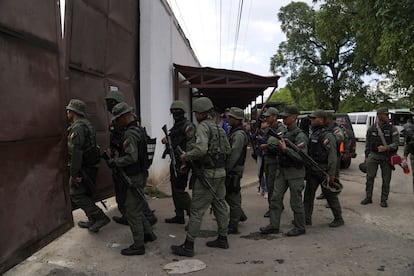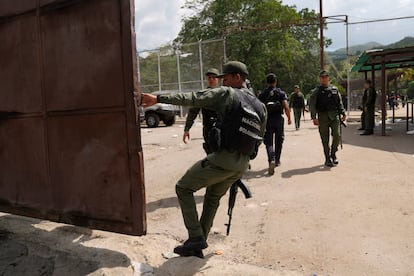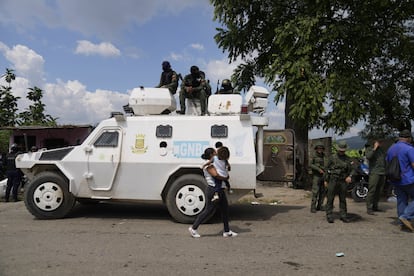Venezuela deploys 11,000 troops to take over prison controlled by Tren de Agua gang
The capture of ‘El Niño Guerrero,’ the leader of the international criminal organization, has not been confirmed despite the massive police and military operation


The Venezuelan government took action early on September 20 against the Tren de Aragua gang, an international criminal organization operating from the Tocorón Penitentiary in the state of Aragua, two hours from Caracas. The initial phase of the raid — dubbed the Cacique Guaicaipuro Liberation Operation — was deemed successful. However, there has been no official confirmation of the capture of gang leaders, including Tren de Aragua chief Héctor Rutherford Guerrero Flores (aka “El Niño Guerrero”). Guerrero has managed his criminal enterprise from the prison for over a decade with the tacit consent of government officials. Some reports indicate that the criminals escaped before the prison was seized.
Tren de Aragua has become a problem for the entire region. The significant outflow of Venezuelans in the last five years included many gang members who extended their human trafficking operations and criminal network beyond the country’s borders. The gang formed between 2013 and 2015 out of the labor unions that were building a still-incomplete railway line in central Venezuela. At first, they extorted local merchants and residents, but later expanded their criminal activities to include kidnapping and drug trafficking, ultimately evolving into a transnational organization.

Tren de Aragua chief El Niño Guerrero established his headquarters in Tocorón Penitentiary and turned it into a private fiefdom. He financed his prison operation by collecting a weekly fee of $8-$10 dollars from the nearly 3,000 inmates, a common system of prison governance throughout the country. According to a report by independent Venezuelan news outlet Runrun.es, the Tocorón Penitentiary operated without any government oversight, and included a nightclub, swimming pool, shops, betting parlors, a zoo, and restaurants. Several investigations revealed that the gang has operations in at least 13 of Venezuela’s 24 states, as well as in Colombia, Chile, Peru, Brazil, Bolivia, Ecuador, and Costa Rica. It is believed to have around 4,000 members and has fought with Colombia’s National Liberation Army (ELN) guerrilla group to control criminal activities along the shared border.
The government issued a statement that the operation dismantled “a center of conspiracy and crime used by an international criminal network against the Venezuelan people.” According to the Venezuelan Prisons Observatory (OVP), a non-governmental organization (NGO) working to improve human rights for prisoners, some inmates surrendered while others escaped through tunnels and into the mountains surrounding the prison. The OVP issued a statement expressing support for the government’s effort to regain control of its prisons, but emphasized the need to hold the “pranes” (criminal prison leaders) accountable for their crimes instead of allowing them to escape.

The government claims that its massive deployment prevented a large-scale escape from Tocorón Penitentiary. Speaking on the state-owned VTV network, Interior and Justice Minister Remigio Ceballos said that its forces protected the human rights of prisoners and safeguarded residents of nearby towns. Nicolás Maduro also made a television appearance to praise the operation. Meanwhile, the Independent International Fact-Finding Mission on human rights in Venezuela presented its fourth report to the United Nations. The report reveals the Venezuelan government’s systematic human rights violations, such as persecution of dissenters, torture, arbitrary detentions, media closures and crimes against humanity. While the number of cases has declined, the report cautions that attacks on “civic spaces” have intensified, specifically targeting union leaders, activists, and journalists.
No deaths, injuries, or arrests have been reported in Tocorón since 11,000 troops were deployed there. Videos from the scene showed burning shacks that housed prisoners, several hours of explosions, and tanks and armored vehicles from Caracas assaulting the facility.

Sign up for our weekly newsletter to get more English-language news coverage from EL PAÍS USA Edition
Tu suscripción se está usando en otro dispositivo
¿Quieres añadir otro usuario a tu suscripción?
Si continúas leyendo en este dispositivo, no se podrá leer en el otro.
FlechaTu suscripción se está usando en otro dispositivo y solo puedes acceder a EL PAÍS desde un dispositivo a la vez.
Si quieres compartir tu cuenta, cambia tu suscripción a la modalidad Premium, así podrás añadir otro usuario. Cada uno accederá con su propia cuenta de email, lo que os permitirá personalizar vuestra experiencia en EL PAÍS.
¿Tienes una suscripción de empresa? Accede aquí para contratar más cuentas.
En el caso de no saber quién está usando tu cuenta, te recomendamos cambiar tu contraseña aquí.
Si decides continuar compartiendo tu cuenta, este mensaje se mostrará en tu dispositivo y en el de la otra persona que está usando tu cuenta de forma indefinida, afectando a tu experiencia de lectura. Puedes consultar aquí los términos y condiciones de la suscripción digital.








































